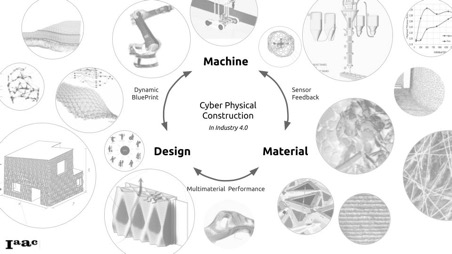IAAC – Master in Robotics and Advanced Construction
Studio III
Faculty: Alexandre Dubor
Faculty Assistants: Marielena Papandreu, Vincent Huyghe
ROBOTS CRAFTS INTERACTIONS

Credits: Alexandre Dubor
Syllabus
As our society evolves to lower our ecological impact on the planet, the construction industry needs to reduce its energy consumption, material extraction, and waste generation, while improving productivity and affordability. Shifting to natural and recycled resources is a challenge for large industrial processes that are tuned for mass production of standard material and struggle with unpredictable / heterogeneity in the material input. In this context, sensor, robotics, and algorithmic design offer the opportunity to create new products that can adapt to this stream of sustainable material, keeping high productivity and low-cost production, yet offering new possibilities in design optimization and final performance. Inspired by the craftsmanship’s capacity to creatively adapt to materials and demands, a new robotic craft is envisioned as a possible response.
How will we design architecture in this new robotic craft paradox between the precision of the technique, a new sensitivity for our environment, and the singular creativity of craftsmanship? How do digital design and fabrication processes negotiate with the unpredictability of natural and recycled materials?
This research studio will allow students to develop a research project that brings together learnings acquired over the 1st year of the master program, possibly using computational design, robotic fabrication, sensor, robotic control, machine learning, and human-machine interaction into a coherent solution for the construction industry. Studio 3 will start from pre-existing research (either developed by the student during the year or by other MRAC students in the previous edition of Studio 3) and will be developed in an agile process of short iterations cycle, based on learning by doing performance-driven research. The studio intends to conclude with a large-scale prototype, and a vision of the future application, capable to convince the AEC industry.
Learning Objectives
While the seminars and workshops of the MRAC third term allow students to gain knowledge into Human-Machine interaction and Machine learning, the Studio class will frame students’ works toward their 1st year “Final project”, which should be understood as the synthesis of all three terms of the master, combining knowledge and topics of previous seminar(s) and/or workshop(s) into one clear proposal for a better AEC industry.